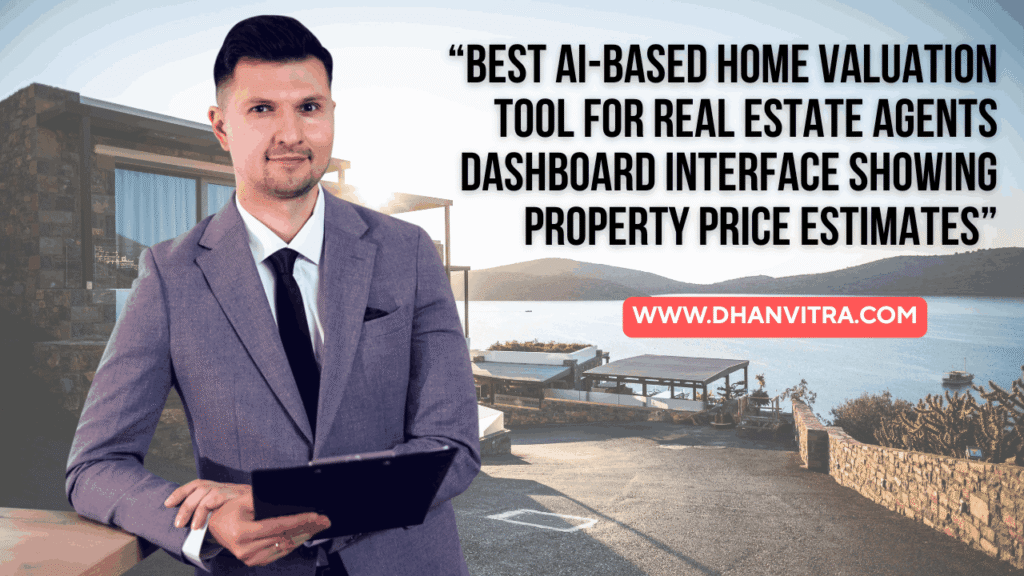
At Dhanvitra, we believe real estate professionals deserve tools that simplify their work, boost efficiency, and help close deals faster. In today’s fast-paced property market, relying on outdated spreadsheets or fragmented systems is no longer enough. That’s why we’re diving deep into the world of cloud-based Customer Relationship Management (CRM) systems—powerful, online platforms designed to streamline client interactions, automate lead management, and keep your business running from anywhere. Whether you’re a solo agent or part of a growing real estate team, understanding how cloud-based CRMs work is your first step toward smarter selling, better customer experiences, and long-term success.
Table of Contents
Secret 1 – Instant Access to Data Anywhere
Imagine you’re standing in a penthouse apartment, and a potential buyer asks about comparable listings or the full history of the property. Without cloud-based CRM, you’d be flipping through files or waiting until you’re back at your desk. But with a cloud-based CRM, that information is at your fingertips in seconds. This isn’t just about convenience — it’s about empowerment. Agents worldwide are no longer tied to their offices. Whether you’re in New York, Sydney, or Cape Town, you can pull up client records, transaction histories, or marketing materials instantly from your phone or laptop. This level of mobility transforms how you operate, letting you respond quickly to inquiries, nurture leads on the go, and impress clients with your efficiency.
Cloud-based CRMs also mean real-time updates. If your colleague logs a new buyer request or uploads documents, you’ll see it instantly. No more version confusion, no delays — everyone stays on the same page. This kind of access gives you a competitive edge because today’s buyers expect instant answers, and being able to deliver that builds trust fast.
Secret 2 – Automated Lead Management
Leads are the lifeblood of real estate, but managing them can feel like herding cats. That’s where automated lead management in cloud-based CRMs completely changes the game. Instead of manually inputting leads from social media, open houses, and website forms, the CRM captures them automatically. It tags, segments, and prioritizes them based on your preset rules so you instantly know who’s hot, who’s warm, and who still needs nurturing.
Beyond capturing leads, automation ensures no one falls through the cracks. You can set up workflows where the system sends a personalized email or a text message as soon as a lead enters the database. It can even remind you to follow up with a phone call at the optimal time. This not only saves you time but also dramatically improves conversion rates. For a global audience of agents, this level of automation can mean doubling productivity without doubling your workload. You’re no longer drowning in spreadsheets and sticky notes — you’re operating like a modern sales powerhouse.
Secret 3 – Personalized Client Experiences
Think about the last time you felt like a company truly “got” you. That’s exactly what today’s buyers and sellers expect from real estate agents. Cloud-based CRMs make it easy to deliver personalized experiences at scale. With detailed profiles for every client — from preferred neighborhoods to communication style — you’re not just selling property, you’re curating experiences.
Using built-in analytics, you can identify what types of listings resonate most with each client, their preferred communication times, and even their likelihood of making a purchase soon. This turns your follow-ups from generic “just checking in” messages to meaningful, relevant conversations. And it’s not just emails — you can customize everything from your property recommendations to open-house invites.
Globally, this is a game-changer because client expectations are universal: everyone likes to feel special. By using the data you already have in your CRM, you show clients you’re paying attention, which increases loyalty, referrals, and ultimately, sales.
Secret 4 – Seamless Integration With Real Estate Tools
No one likes logging into five different platforms to get their work done. A standout feature of cloud-based CRMs is how effortlessly they integrate with the tools you already use. Whether it’s connecting with MLS listings, syncing your email and calendar, or linking to marketing platforms like Mailchimp or social media ads, integration eliminates data silos and reduces manual entry.
For example, when a new property hits the MLS, your CRM can automatically update your client lists with matching preferences and even send alerts to interested buyers. If you’re running ad campaigns on Facebook or Google, those leads flow directly into your CRM without you lifting a finger. This creates a streamlined ecosystem where everything “talks” to each other — your listings, your leads, your marketing campaigns, and your follow-up tasks.
For agents working across multiple markets or even countries, seamless integration also means consistent processes. Whether you’re managing a team in Dubai or closing a deal in London, everyone has access to the same, synced-up information. This kind of efficiency not only saves time but also creates a professional impression that today’s clients notice immediately.
Secret 5 – Scalable and Cost-Effective
A major reason real estate agents and brokerages worldwide are embracing cloud-based CRM systems is their built-in scalability and affordability. Unlike traditional CRMs that demand a big upfront investment in servers, IT staff, and complex licensing fees, cloud-based platforms follow a “pay for what you use” model. This flexibility is a game-changer for solo agents and growing teams alike.
When your business is just starting, you might only need a few user accounts and basic features. As your client base expands, you can easily upgrade your plan to include advanced tools like AI-driven lead scoring, marketing automation, or integrated analytics—without needing new hardware or major setup costs. This ability to grow at your own pace ensures you’re never overpaying for features you don’t yet need, while still leaving plenty of room to scale when your agency takes off.
On a global level, this model makes cloud-based CRMs incredibly attractive to both small independent brokers in emerging markets and large multinational real estate firms. It levels the playing field—everyone gets access to enterprise-level tools without the enterprise-level expense.
Key Benefits of Cloud-Based CRM for Real Estate
Cloud-based CRMs do more than simply store your contacts. They’re like a digital nerve center for your business. By centralizing all your leads, listings, and communications in one secure online hub, you cut down on the chaos of multiple spreadsheets and apps.
One standout benefit is productivity. Agents can automate routine tasks—sending appointment reminders, following up on inquiries, and logging communications—freeing up time to actually close deals. Global real estate professionals also appreciate the security and reliability of modern cloud platforms. Most providers use bank-level encryption, automatic backups, and stringent compliance standards, which means your client’s sensitive data is far safer than it would be on a personal laptop or office server.
Another benefit is collaboration. A team spread across different cities or even continents can work on the same platform, see real-time updates, and communicate instantly. This global connectivity makes cross-border real estate deals smoother, giving agents an edge in a competitive marketplace.
Common Challenges and How to Overcome Them
While cloud-based CRMs are powerful, making the switch isn’t always seamless. One common challenge is data migration—transferring years of contacts and notes from old systems to the new platform. The best approach here is to use the built-in migration tools offered by most CRM vendors or hire a specialist to ensure accuracy. Starting fresh with clean, verified data also prevents future headaches.
Another challenge is user adoption. Even the best system won’t work if your team doesn’t use it. Training is key—offer hands-on workshops or short tutorial sessions to show agents exactly how the new CRM will make their jobs easier. When users see the real-world benefits—like faster lead follow-ups or automated reminders—they’re more likely to embrace it fully.
Lastly, there’s the question of ongoing support. Choose a vendor with reliable customer service and plenty of learning resources. Many cloud-based CRMs now provide 24/7 live chat, dedicated onboarding managers, and global support teams to make the transition as smooth as possible.
Tips for Choosing the Right Cloud-Based CRM
Picking the right cloud-based CRM can feel overwhelming with so many options on the market. Start by thinking about your specific real estate needs. Do you mainly want to manage leads? Integrate marketing campaigns? Or track sales and commissions? Clarity about your priorities helps narrow down the options.
Next, evaluate the ease of use. A CRM should simplify your life, not complicate it. Look for clean dashboards, intuitive navigation, and mobile-friendly designs. Ask for a trial or demo to see if the interface feels natural to you and your team.
Another crucial factor is integration. The best CRMs link effortlessly with tools you already use—like MLS databases, email marketing platforms, or digital signature apps. This eliminates redundant data entry and creates a seamless workflow.
Finally, think about scalability and support. Even if you’re a small operation today, you’ll likely grow in the future. Pick a CRM that can grow with you, offering advanced features as you need them. And ensure the vendor offers strong global customer support and data security measures, especially if you’re working with international clients.
Choosing the right CRM isn’t just a tech decision—it’s a strategic investment in your ability to compete globally. By focusing on scalability, usability, integrations, and support, you’ll set yourself up for long-term success in the fast-paced world of real estate.
Future of Cloud-Based CRM in Real Estate
The future of cloud-based CRM in real estate is not just about digitalizing processes — it’s about redefining how agents connect with their clients, properties, and data. As the world becomes more mobile and client expectations grow higher, the tools real estate professionals rely on must evolve, too. A cloud-based CRM will no longer simply be a database of client information; it will become an intelligent partner guiding agents to close deals faster and build stronger relationships.
AI and Predictive Analytics
Artificial Intelligence (AI) is turning cloud-based CRMs into smart systems capable of predicting client behavior. Imagine logging into your CRM and instantly seeing which leads are most likely to convert, or receiving automated suggestions on the best time to contact a prospect. Predictive analytics will help agents move away from guesswork, enabling them to focus on high-value activities and nurturing serious buyers and sellers. This is especially powerful on a global scale, where agents deal with thousands of data points across different markets and time zones.
Virtual Reality (VR) and Immersive Experiences
Virtual tours are already a game-changer in real estate marketing, but integrating VR into cloud-based CRMs will make the experience seamless. In the future, agents could manage VR property tours directly within their CRM dashboards, track client engagement during virtual showings, and immediately follow up with prospects. This kind of immersive experience will break geographical barriers, letting buyers in one country “walk through” a property on another continent—all coordinated through a single CRM platform.
Hyper-Personalization with Big Data
Another major shift will be the rise of hyper-personalized recommendations. Cloud-based CRMs will leverage massive datasets to help agents understand not only what properties clients like but why they like them. From preferred neighborhoods to design styles, the CRM will automatically match clients with properties that meet their unique preferences, reducing time spent on irrelevant showings and increasing satisfaction for buyers and sellers alike.
Integration with Smart Devices and IoT
As homes themselves become smarter—thanks to Internet of Things (IoT) technology—future CRMs will integrate with property-level data. Agents might see energy efficiency scores, security system stats, or maintenance updates directly in their CRM. This real-time connection to a property’s “digital twin” will create a new level of transparency and value for clients worldwide.
Conclusion
Cloud-based CRM systems are more than just a technological upgrade—they are the backbone of the modern real estate business. By streamlining client communication, automating tedious tasks, and unlocking powerful insights, they allow agents to focus on what really matters: building trust and closing deals. As technology advances, these systems will evolve into intelligent ecosystems powered by AI, VR, and real-time data, creating unmatched opportunities for agents across the globe. For real estate professionals, embracing cloud-based CRM now isn’t just about staying competitive today; it’s about future-proofing your business for tomorrow.
FAQs
What is a Cloud-Based CRM for Real Estate?
A cloud-based CRM for real estate is an online platform where agents can store, manage, and analyze client data. Unlike traditional systems, it’s accessible from any device with an internet connection, making it ideal for professionals working in fast-paced, mobile environments.
How Does Cloud CRM Improve Lead Management?
Cloud CRM improves lead management by automatically capturing leads from multiple channels—websites, social media, and property listings—and organizing them in one place. Agents can track lead progress, set reminders for follow-ups, and prioritize prospects with higher conversion potential.
Is Cloud CRM Secure for Sensitive Client Data?
Yes, most reputable cloud-based CRMs use advanced security measures like encryption, multi-factor authentication, and regular backups. This ensures that sensitive information about clients and transactions remains protected, even if your device is lost or compromised.
What Features Should I Look for in a CRM?
Look for features such as automated lead tracking, customizable workflows, seamless integration with marketing tools, AI-powered insights, and mobile accessibility. A CRM designed specifically for real estate professionals can save time and boost productivity.
How Much Does a Cloud CRM Typically Cost?
Costs vary depending on features and the size of your team. Many platforms offer scalable, pay-as-you-go models, allowing solo agents or small teams to start affordably and upgrade as their business grows.









